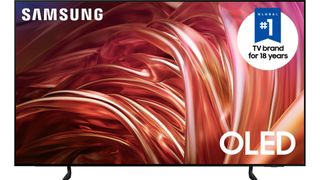Samsung's new, cheaper OLED TVs are now available to buy
The S85D series is here

Samsung has announced the US availability of its Samsung S85D OLED TVs, a new, cheaper OLED TV series sold in screen sizes ranging from 55 to 77 inches.
The Samsung S85D series sits beneath the flagship Samsung S95D and mid-range Samsung S90D OLED TVs. We selected the S90D’s predecessor, the Samsung S90C as our best TV in 2023 for its compelling combination of performance and value, and expect that the new S85D series will follow in its footsteps.
Pricing for the S85D series OLED TVs is as follows:
- 55-inch: $1,699.99 (around £1,350 / AU$2,560)
- 65-inch: $2,099.99 (around £1,670 / AU$3.165)
- 77-inch: $3,399.99 (around £2,700 / AU$5,120)

According to Samsung, the new OLED TVs feature the same NQ4 AI Gen2 Processor and 4K AI Upscaling found in the company’s other 2024 OLED TVs, the flagship S95D series included. They also support Pantone Validated Colors and come with the Samsung TV Plus free TV portal and Samsung Gaming Hub.
Samsung S85D TVs provide four HDMI 2.1 ports with 120Hz and ALLM support. For audio, they have 2 x 20-watt built-in speakers, Samsung’s Object Tracking Sound Lite, and a Q Symphony feature that lets the TV’s speakers work in tandem with a Samsung soundbar for an enhanced presentation.
Along with the S85D OLED TVs, Samsung also announced US pricing and availability for its new 42-, 48-, and 83-inch S90D OLED TV models. Pricing for other sizes had previously been announced.
- 42-inch: $1,399.99 (coming soon)
- 48-inch: $1,599.99 (around £1,270 / AU$2,400)
- 83-inch: $5,399.99 (around £4,290 / AU$8,140)
With their smaller screen size options, 144Hz refresh rate with FreeSync Premium VRR, plus the Samsung Gaming Hub cloud-based gaming portal found in the company’s other TVs, Samsung is positioning the S90D series as the perfect option for gamers.
Get daily insight, inspiration and deals in your inbox
Get the hottest deals available in your inbox plus news, reviews, opinion, analysis and more from the TechRadar team.

Opinion: The more OLED TVs the better – if it keeps prices down
The best OLED TVs are getting brighter and, with 83-inch models now common, bigger. But OLED TVs generally remain a pricey option compared to regular QLED and even mini-LED TVs. That’s why it’s encouraging to see Samsung branch out with a third, lower-cost OLED TV series in the new S85D models, and add smaller, more affordable screen sizes to its S90D series.
That’s not to say Samsung’s new S85D OLED TVs are cheap. They exactly match the launch prices of last year’s S90C series, which the higher-cost models in the new S90D series replace. So, while prices of Samsung OLED TVs in general are going up (the new S95D series flagship OLEDs start at $2,599 for the 55-inch screen size), at least the company is providing us with a less expensive option.
One important thing to consider about the new TVs is the type of display panel being used. While the new S95D series TVs use QD-OLED panels manufactured by Samsung, the 42-, 48-, and 83-inch S90D series models use regular W-OLED panels sourced from LG display. Even more confusing, Samsung hasn’t confirmed that the other screen sizes in the S90D series will use a QD-OLED instead of a W-OLED panel, a situation that’s been characterized as an OLED TV “screen lottery.”
Samsung hasn’t specifically stated if the new S85D series will use QD-OLED or W-OLED panels, though given the cheaper pricing, it’s possible that Samsung went with W-OLED. That’s not to say the new S85D TVs won’t look good. We had a chance to do a hands-on test of a 48-inch Samsung S90D OLED, a model that uses a W-OLED panel, and found the picture quality to be very good overall.
QD-OLED or W-OLED, the new Samsung S85D series TVs are the company’s entry-level OLED models for 2024, and while we won’t know for sure about its performance until we get an S85D in for testing, we’re hoping it will provide the same bang for the buck as last year’s Samsung S90C series.
You might also like,,,

Al Griffin has been writing about and reviewing A/V tech since the days LaserDiscs roamed the earth, and was previously the editor of Sound & Vision magazine.
When not reviewing the latest and greatest gear or watching movies at home, he can usually be found out and about on a bike.
